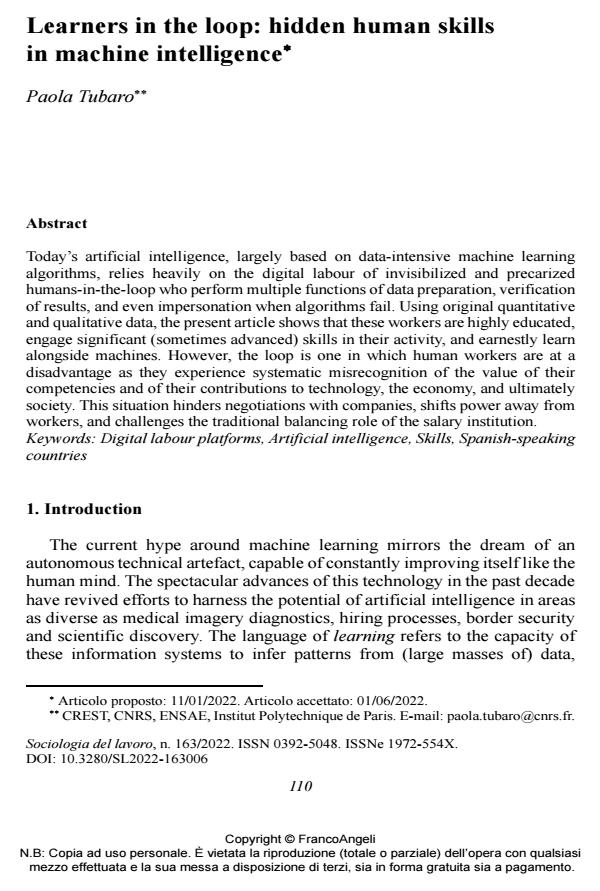Learners in the loop: hidden human skills in machine intelligence
Journal title SOCIOLOGIA DEL LAVORO
Author/s Paola Tubaro
Publishing Year 2022 Issue 2022/163
Language English Pages 20 P. 110-129 File size 236 KB
DOI 10.3280/SL2022-163006
DOI is like a bar code for intellectual property: to have more infomation
click here
Below, you can see the article first page
If you want to buy this article in PDF format, you can do it, following the instructions to buy download credits

FrancoAngeli is member of Publishers International Linking Association, Inc (PILA), a not-for-profit association which run the CrossRef service enabling links to and from online scholarly content.
Today’s artificial intelligence, largely based on data-intensive machine learning algorithms, relies heavily on the digital labour of invisibilized and precarized humans-in-the-loop who perform multiple functions of data preparation, verification of results, and even impersonation when algorithms fail. Using original quantitative and qualitative data, the present article shows that these workers are highly educated, engage significant (sometimes advanced) skills in their activity, and earnestly learn alongside machines. However, the loop is one in which human workers are at a disadvantage as they experience systematic misrecognition of the value of their competencies and of their contributions to technology, the economy, and ultimately society. This situation hinders negotiations with companies, shifts power away from workers, and challenges the traditional balancing role of the salary institution.
Keywords: Digital labour platforms, Artificial intelligence, Skills, Spanish-speaking countries
- Complex thinking through a Transition Design-guided Ideathon: testing an AI platform on the topic of sharing economy Jorge Sanabria-Z, Isolda Margarita Castillo-Martínez, Laura Icela González-Pérez, María Soledad Ramírez-Montoya, in Frontiers in Education 1186731/2023
DOI: 10.3389/feduc.2023.1186731 - 2024 International Conference on Decision Aid Sciences and Applications (DASA) Entesar Al Nama, Maqsood Mahmud, Huda Al Madhoob, pp.1 (DOI:10.1109/DASA63652.2024.10836337)
- Patient and Physician Exposure to Artificial Intelligence
Hype Scott Monteith, Tasha Glenn, John R. Geddes, Peter C. Whybrow, Eric D. Achtyes, Rita Bauer, Michael Bauer, in Pharmacopsychiatry /2025
DOI: 10.1055/a-2577-7214 - Dis//assemblages of AI: repair labor and resistance in the automated workplace Dominique A. Montiel Valle, Samantha Shorey, in Information, Communication & Society /2024 pp.2022
DOI: 10.1080/1369118X.2024.2371794 - 2025 IEEE 12th International Conference on Data Science and Advanced Analytics (DSAA) Maike Holtkemper, Christian Beecks, pp.1 (DOI:10.1109/DSAA65442.2025.11248023)
Paola Tubaro, Learners in the loop: hidden human skills in machine intelligence in "SOCIOLOGIA DEL LAVORO " 163/2022, pp 110-129, DOI: 10.3280/SL2022-163006